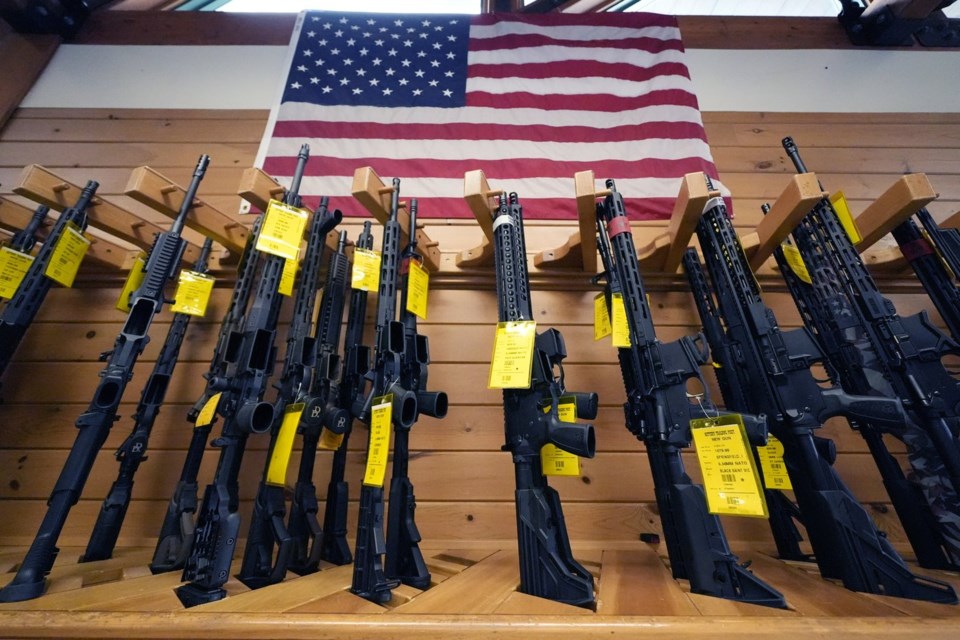PORTLAND, Maine (AP) — With eleventh hour guidance from the state, Maine gun retailers on Friday began requiring a three-day wait period for gun purchases under one of the new safety laws adopted following the state’s deadliest mass shooting.
Maine joined a dozen other states with similar laws, requiring that buyers wait 72 hours to complete a purchase and retrieve a weapon. The law is among several gun-related bills adopted after an Army reservist killed 18 people and injured 13 others on Oct. 25, 2023, in Lewiston.
The new law wouldn't have prevented the tragedy — the gunman bought the rifle legally months earlier — but Friday's milestone was celebrated by gun safety advocates who believe it will prevent gun deaths by providing a cooling-off period for people intent on buying a gun to do harm to others or themselves.
“These new laws will certainly save lives, both here in Maine and throughout the nation,” said Nacole Palmer, executive director of the Maine Gun Safety Coalition.
Gun store owners complained about the guidance, released just Tuesday, and the loss of sales to out-of-state visitors during Maine’s busy summer tourism season. They also said the waiting period will take a toll on gun shows.
In Kittery, Dave Labbe from the Kittery Trading Post said there would be close to zero completed rifle sales at its main store beginning Friday as customers subject to the waiting period will have to return to pick up their firearms. He is worried shoppers won’t buy guns because the waiting period requires them to make an extra trip to the store.
“You can imagine how I feel,” he said.
Unlike other Maine dealers, Kittery Trading Post's out-of-state buyers of rifles and shotguns have the option to move those sales to its New Hampshire facility to complete a same-day purchase. But that increases business costs and inconveniences customers. In some cases, the customer may prefer to ship the firearm to a dealer in their home state, Labbe said.
At the store on Friday, shoppers poured inside on a rainy day to make purchases of clothing and outdoor gear, but foot traffic in the gun department appeared to be slower than usual. A sign overhead alerted buyers to the new law.
Some retailers claimed the guidance was late and vague.
“It’s as clear as mud,” said Laura Whitcomb from Gun Owners of Maine. She noted that gray areas include the legal definition for the “agreement” that must be reached to trigger the waiting period.
Critics of the law have vowed to sue. They contend it harms only law-abiding citizens while doing nothing to stop criminals from accessing weapons illegally. They also contend people who intend to harm themselves will find another way to do so if they are unable to purchase a gun on the spot. Violating the law is a civil infraction with a fine of $200 to $500 for a first offense and $500 to $1,000 for subsequent violations.
The waiting period law went into effect without the signature of Democratic Gov. Janet Mills. It was one of a series of bills adopted after the mass killings at a bowling alley and a bar and grill in Lewiston.
Mills told lawmakers during her State of the State address that doing nothing was not an option after the tragedy.
The laws bolstered the state’s “yellow flag” law allowing weapons to be taken from someone in a psychiatric crisis, criminalized the transfer of guns to prohibited people and required background checks for people who advertise a gun for sale on Craigslist, Facebook Marketplace or elsewhere.
Maine is a state with a long hunting tradition and the bills drew opposition from Republicans who accused Democrats, who control both legislative chambers, of using the tragedy to advance proposals, some of which had previously been defeated.
David Sharp, The Associated Press



